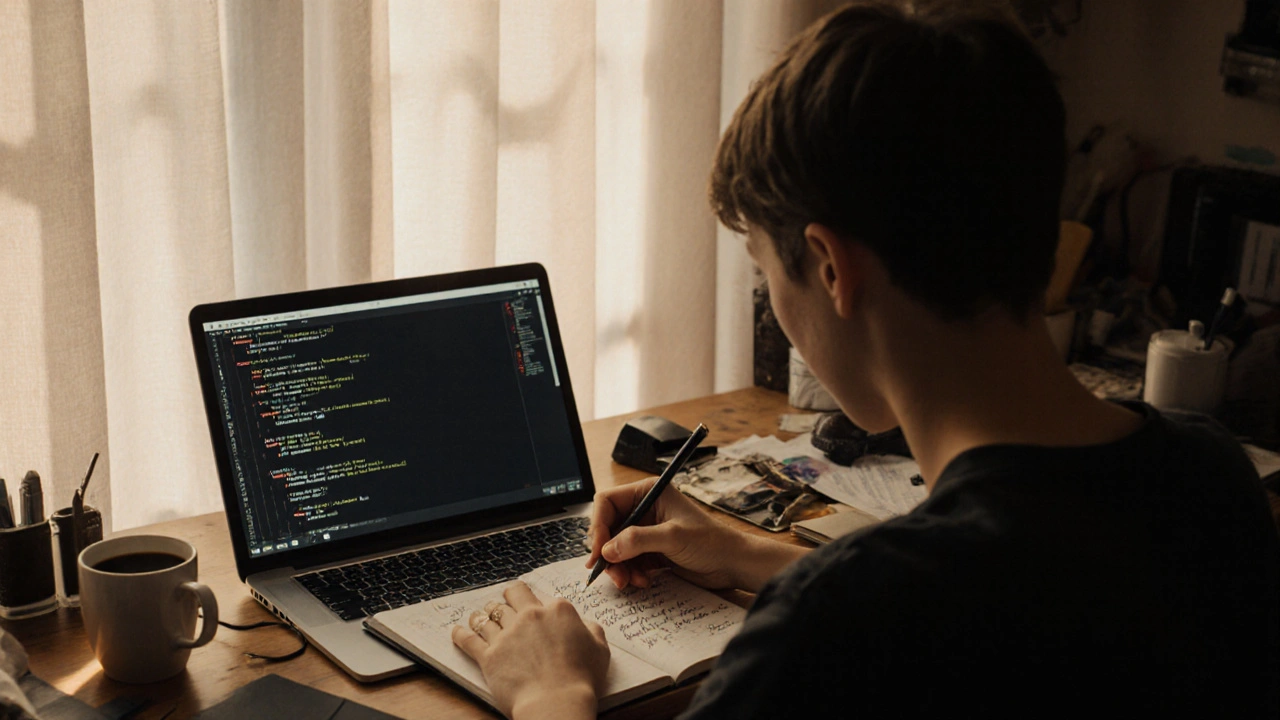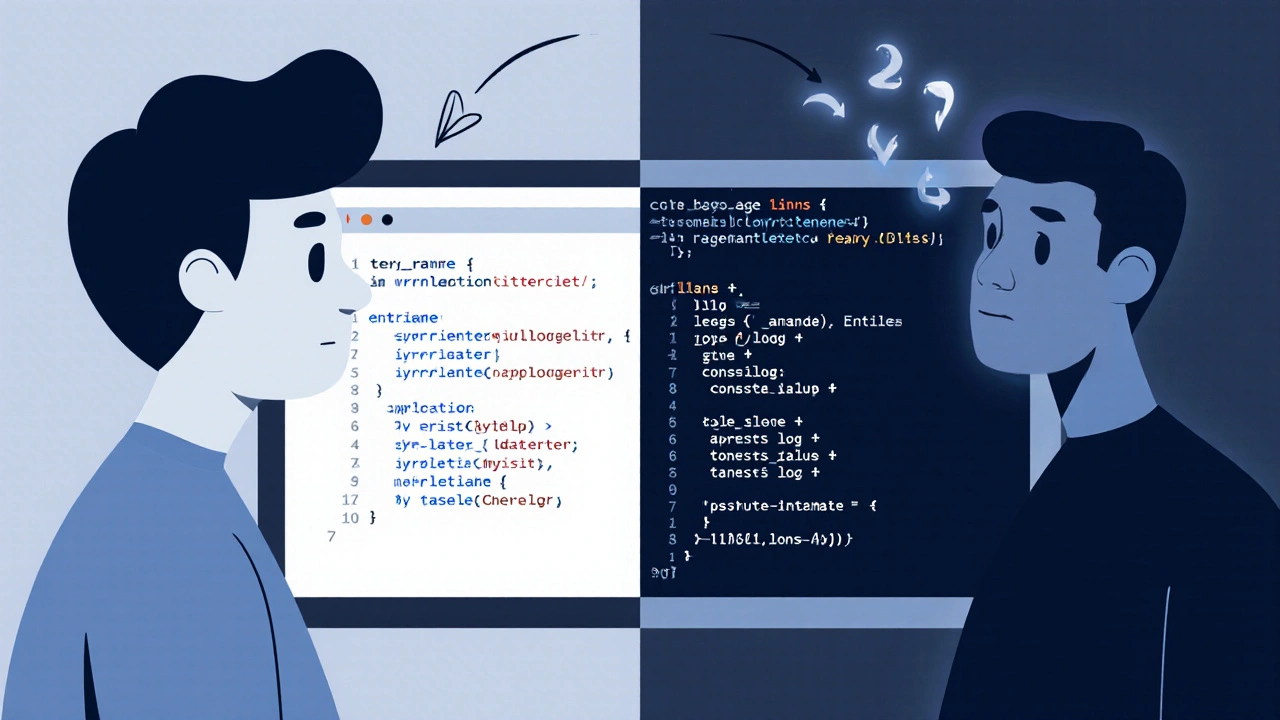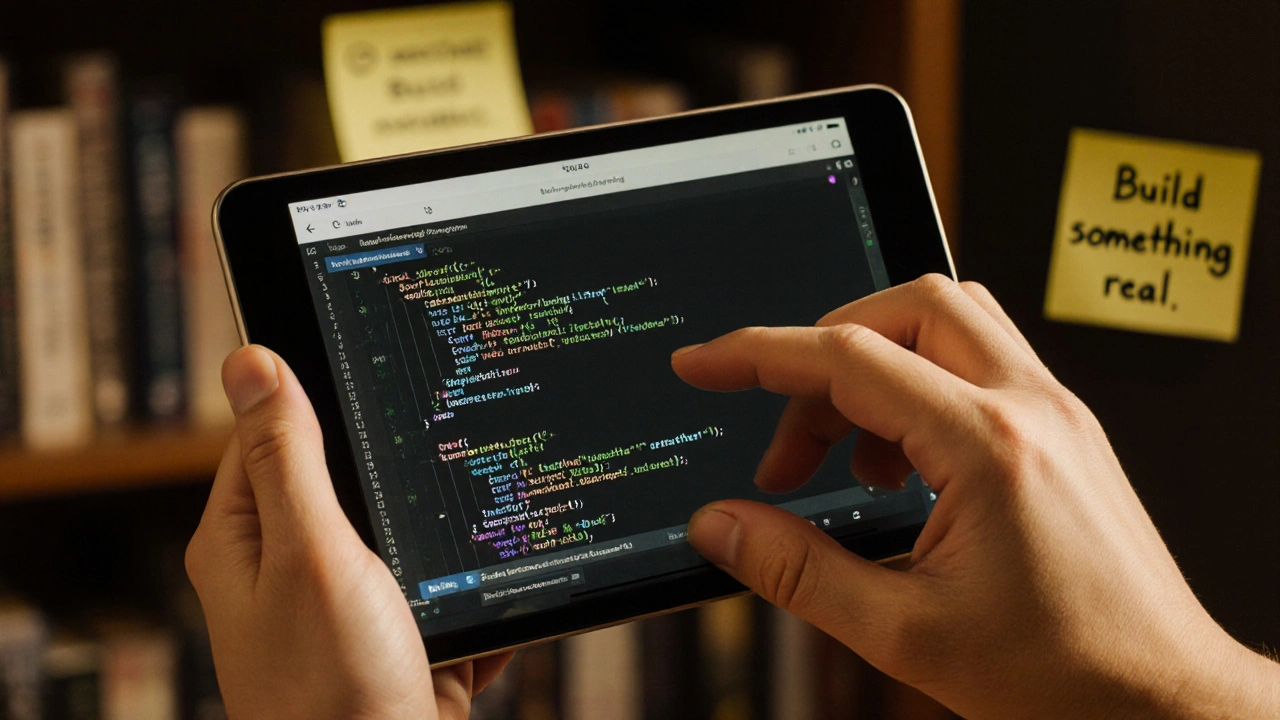Coding Tips for the Aspiring Programmer: Practical Advice to Build Real Skills

Debugging Practice Challenge
Debugging Exercise
This JavaScript function is supposed to find the largest number in an array, but it has a bug. Your task is to identify and fix the error.
The Broken Code
function findLargest(arr) {
let largest = arr[0];
for (let i = 1; i < arr.length; i++) {
if (arr[i] < largest) { // This is the bug
largest = arr[i];
}
}
return largest;
}
// Test case
console.log(findLargest([5, 3, 8, 1])); // Expected: 8, but returns 5
Stop chasing tutorials. Start building habits.
Most aspiring programmers spend months watching videos, copying code from GitHub, and finishing courses that feel like they’re going nowhere. You finish a course, feel proud for a day, then hit a wall when you try to build something on your own. That’s not because you’re not smart enough. It’s because you’re learning the wrong way.
The truth? Coding isn’t about memorizing syntax. It’s about learning how to think in problems, break them down, and fix them one small step at a time. The best coders aren’t the ones who know the most languages-they’re the ones who know how to get unstuck.
Code every day, even if it’s just for 20 minutes
Consistency beats intensity. If you code for 20 minutes every day, you’ll build more skill in a month than someone who crams for 5 hours once a week. Why? Because your brain needs repetition to form neural pathways. Every time you sit down to code, even if you’re just fixing a typo or rewriting a function, you’re reinforcing your understanding.
Here’s how to make it stick:
- Set a daily alarm: 7:30 a.m. or 8 p.m.-doesn’t matter, just pick a time.
- Work on something small: Fix a bug in an old project. Rewrite a function to make it cleaner. Add a button that does something simple.
- Don’t wait for inspiration. Show up anyway.
After two weeks, you’ll notice you’re thinking about code even when you’re not at the keyboard. That’s when learning becomes automatic.
Write code by hand-yes, really
Typing code on a keyboard feels fast. But writing it out on paper forces you to slow down. When you write a loop or a function by hand, you can’t skip over parts. You have to think about every bracket, every variable name, every semicolon.
Try this: Pick a simple algorithm-like reversing a string or finding the largest number in an array. Write it out on paper without looking at a computer. Then, only after you’ve written it out, type it in and run it. You’ll catch mistakes you’d normally miss. You’ll start noticing patterns in how code is structured.
This isn’t just a trick for beginners. Senior developers do this before interviews or when debugging complex logic. Your hands remember what your eyes skip over.
Read code like you read books
You wouldn’t learn to write by only writing. You’d read great writers first. The same goes for code. Spend 15 minutes a day reading real code-not tutorials, not examples from Stack Overflow, but actual open-source projects.
Start with small projects: a simple calculator, a to-do list app, a weather widget. Pick one written in the language you’re learning. Read it line by line. Ask yourself:
- Why did they structure it this way?
- What’s the purpose of this function?
- How would I have done it differently?
GitHub is full of clean, well-documented projects. Look for ones with high stars and recent updates. Don’t worry if you don’t understand everything. Just get used to seeing how real code looks. After a few weeks, you’ll start recognizing patterns: how people name variables, how they handle errors, how they organize files.

Learn to debug before you learn to write code
Most beginners think coding is about writing new lines. It’s not. It’s about fixing what’s broken. In real projects, 70% of your time will be spent debugging. That’s not a bug-it’s the job.
Here’s how to get better at it:
- When your code breaks, don’t panic. Don’t copy-paste a solution from Google right away.
- Read the error message. It’s usually telling you exactly what’s wrong. If you see “undefined variable,” it means you used a name that doesn’t exist.
- Use console.log() or print() statements. Put them before and after the line that’s breaking. See what values are actually there.
- Break the problem into smaller pieces. Test one part at a time.
One of the most powerful habits: Keep a debugging journal. Write down every error you get, what you tried, and what fixed it. After 10 entries, you’ll start seeing patterns. You’ll recognize common mistakes before they happen.
Build something real-even if it’s ugly
Don’t wait until you’re “ready.” You’ll never be ready. The best way to learn is to build something that matters to you. It doesn’t have to be perfect. It doesn’t even have to work well. But it has to be yours.
Here are a few simple ideas to get you started:
- A personal budget tracker that saves your spending in a text file.
- A quiz app that asks you questions about your favorite movie.
- A page that shows the current weather in your city using a free API.
When you build something real, you run into real problems: How do I save data? How do I make the button work? Why does the layout break on my phone? These are the questions that teach you more than any tutorial ever could.
And when you finally get it working-even if it’s messy-you’ll feel something no course can give you: confidence.
Ask better questions
When you get stuck, you’ll turn to forums like Stack Overflow. But most questions from beginners are too vague: “My code isn’t working.” That doesn’t help anyone.
Here’s how to ask a question that gets you answers:
- State what you’re trying to do.
- Show the code you wrote (use code blocks, not screenshots).
- Explain what happened when you ran it.
- Write what you expected to happen.
- Include the exact error message.
Example: “I’m trying to load data from a JSON file in Python. I used open() and json.load(), but I get ‘FileNotFoundError’. The file is in the same folder as my script. Here’s my code: [paste code]. I expected it to read the file and print the data, but it says the file doesn’t exist.”
People will help you. Not because you’re lucky, but because you made it easy for them to help.

Compare your code to the best
After you finish a small project, go back and look at how others solved the same problem. Find a well-built version on GitHub. Compare line by line. What did they do differently?
Maybe they used a loop instead of copying code 5 times. Maybe they wrote a function instead of repeating the same logic. Maybe they added comments where you didn’t.
This isn’t about copying. It’s about learning the gap between your current level and the next one. Every time you do this, you’re upgrading your internal standard.
Don’t switch languages every month
You’ll hear people say, “Python is easier,” then “No, JavaScript is better,” then “You should learn Rust.” Don’t fall for it. Switching languages too often is like learning to drive by switching cars every week. You’ll never get good at any of them.
Pick one language to start: Python for beginners, JavaScript for web, or Java for structure. Stick with it for at least 6 months. Build 3-5 projects in it. Learn its quirks, its libraries, its community.
Once you’re comfortable, learning a second language becomes 10x easier. You already know how to think like a programmer. Now you’re just learning new words.
Progress isn’t linear
There will be days when you feel like you’re getting nowhere. You’ll look at your code from a week ago and think, “I was better then.” That’s normal. Learning to code is like climbing a mountain with fog. You can’t see the top. You can’t see how far you’ve come.
But if you look back three months later, you’ll see it. You’ll realize you’ve solved problems you couldn’t even understand before. You’ll look at code you wrote six months ago and laugh at how messy it was.
That’s growth. It’s quiet. It’s slow. But it’s real.
Keep going
Coding isn’t about talent. It’s about showing up. It’s about fixing one bug at a time. It’s about writing code when you’re tired. It’s about asking for help when you’re stuck. It’s about building something, even if it’s ugly.
You don’t need to be the best. You just need to keep going.